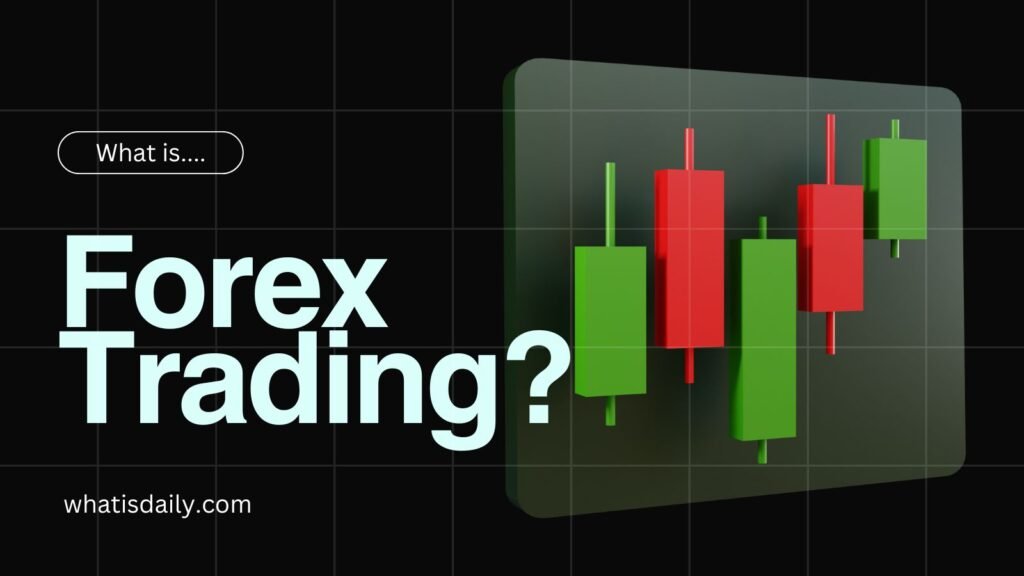Forex trading, also known as foreign exchange trading, is the global system of buying and selling currencies with the aim of making a profit.
Have you ever wondered how much your dollar is worth when you travel abroad or why currency values seem to rise and fall endlessly? Behind those shifts is one of the most fascinating financial markets in the world: forex trading. It’s not just a game for bankers and billion-dollar corporations; it’s a marketplace where anyone—from professional traders to regular people—can participate. With over $6 trillion changing hands every single day, forex is the largest and most liquid market in existence. Understanding how it works isn’t only useful for investors but also gives everyday individuals insight into the hidden forces shaping global prices, businesses, and even travel expenses.
Understanding the Basics of Forex Trading Clearly
Forex trading, at its core, is the simple exchange of one currency for another. This is something you’ve technically done if you’ve ever traveled abroad and swapped your home currency for local bills at an airport booth. The difference, however, is that in forex markets, this happens at enormous scales—banks, governments, companies, and individual traders constantly trade currencies with one another.
Instead of buying single assets like stocks or commodities, forex traders work with currency pairs. Each trade involves buying one currency while selling another. For example, when trading EUR/USD, a trader is speculating on how the euro will move against the U.S. dollar. If you believe the euro will strengthen compared to the dollar, you buy the pair; if you think it will weaken, you sell it.
What makes forex so unique is its global accessibility. Unlike the stock market, which has a central exchange, forex operates over-the-counter, meaning through a network of traders, brokers, and banks. This structure makes it fast-moving and open 24 hours a day, Monday through Friday.
How the Forex Market Operates Behind the Scenes
When people imagine trading, they often think of a buzzing stock exchange floor filled with clapping hands and yelling brokers. But forex doesn’t work like that. Instead, it functions through an electronic network of banks, companies, financial institutions, and traders connecting across time zones. So, when the trading day ends in Asia, Europe picks up, and when Europe closes, New York takes over. This creates a truly nonstop cycle of global activity.
The core players include central banks, multinational corporations, and large institutions. For example, when an airline in Japan purchases oil from Saudi Arabia, it often needs U.S. dollars to finalize the deal. That transaction pulls large amounts of money through the forex markets, altering supply and demand. These behind-the-scenes movements help explain why prices fluctuate constantly.
Unlike the stock market, where supply depends on buyers and sellers of a company’s shares, the forex market reflects the bigger picture—how countries, businesses, and economies interact with one another. That’s why news about interest rates, inflation, or political shifts often triggers sudden and huge impacts in currency values.
What Exactly is Forex Trading?
To put it simply, forex is the act of speculating on currency movements. When you decide to buy one currency expecting it will rise in value compared to another, you are trading forex. The outcome—profit or loss—depends on whether your prediction turns out correct.
Imagine you’re heading to Europe for a holiday, and you exchange $1,000 for euros at a rate of 1.10. Later, the rate moves to 1.15, and if you exchanged your euros back to dollars, you’d receive more than your original $1,000. That’s essentially how forex trading works, except on a much larger scale, and often amplified through leverage.
However, while the concept sounds straightforward, market movements are influenced by many factors: economic data, interest rate decisions, political elections, and even unexpected global events. This makes forex trading both highly rewarding and risky at the same time.
Why Forex Trading Matters Today
Forex matters because it’s the backbone of global trade and finance. Every product you buy, from a smartphone made in Asia to coffee imported from South America, is influenced by currency values. If one currency weakens, imports become more expensive; if it strengthens, exports may become less competitive.
On a personal level, it impacts your daily life more than you think. When you plan a vacation abroad, the amount of money you spend often depends on exchange rates. If your home currency weakens against the destination country’s, your trip suddenly becomes more expensive.
For investors, forex provides a unique opportunity. Since it’s the largest financial market in the world, with over $6.6 trillion traded daily according to the Bank for International Settlements, it offers unparalleled liquidity. This means traders can enter and exit positions quickly without worrying about not finding buyers or sellers.
The Role of Currency Pairs
Forex always works in pairs because one currency must be exchanged for another. These pairs are classified into three main categories:
- Major pairs (such as EUR/USD, GBP/USD, USD/JPY)
- Minor pairs (crosses that do not include the U.S. dollar, e.g., EUR/GBP or AUD/JPY)
- Exotic pairs (a major currency paired with one from an emerging economy, e.g., USD/TRY)
The “base currency” is the first in the pair, while the “quote currency” is the second. If EUR/USD is 1.12, it means one euro is worth 1.12 U.S. dollars. Small fluctuations may look minor, yet leveraged trades can magnify the impact significantly.
Think of currency pairs as seesaws—when one side goes up, the other side goes down. Traders aim to predict which side will rise next.
The Upside and Risks of Forex Trading
Forex trading has its attractive sides. First, it’s incredibly liquid, allowing trades to be executed instantly. Second, it’s flexible—you can trade at night or during lunch breaks because of its 24/5 availability. Third, it doesn’t require huge capital to begin, with many brokers offering entry starting with just a few hundred dollars.
On the flip side, risks loom large. Leverage, one of forex’s defining features, allows you to control huge positions with a small deposit. While this turbocharges gains, it also magnifies losses. Many beginners lose money quickly by failing to manage risk properly.
Additionally, forex markets can react violently to global events. A simple election result or policy change can send currencies plunging within minutes. This unpredictability requires traders to remain disciplined and constantly manage risk.
Common Forex Trading Strategies
Successful forex trading usually comes down to choosing a method and sticking with it. Some of the most common strategies include:
- Day Trading – entering and closing trades within the same day to avoid overnight risks.
- Swing Trading – holding positions for several days to capture bigger market movements.
- Scalping – fast-paced trading with dozens of small deals for minor profits.
- Position Trading – long-term strategies that may last weeks or months.
Choosing your strategy depends on your personal lifestyle. For example, someone with a full-time job may avoid scalping since it demands constant screen time. On the other hand, a day trader might enjoy quick moves and short-term results.
What all successful strategies have in common, however, is a focus on risk management. No matter the method, smart traders never risk more than they can afford to lose.
How Beginners Can Get Started
If you’re interested in forex trading, start by educating yourself on the fundamentals. Learn key terms such as pips (the smallest unit of a price move), lots (trade size), and leverage.
Next, open a demo account with a reliable broker. Platforms like Investopedia recommend using these accounts to practice trading without risking real money. Demo accounts allow newcomers to test strategies and familiarize themselves with currency charts.
Finally, begin trading small amounts and always manage risk. One common tip is to never risk more than 1–2% of your balance on a single trade. This way, even if you make mistakes—something every beginner does—you protect your account while learning.
FAQs about Forex Trading
What is the difference between forex and stock trading?
Forex involves trading global currencies, while stock trading deals with company shares. The forex market also dwarfs the stock market in size and operates around the clock five days a week.
What is the minimum to start forex trading?
Some brokers allow traders to start with as little as $50, but having more capital offers better flexibility and risk management.
How does leverage work in forex trading?
Leverage allows traders to borrow money from a broker to control larger positions. For example, 1:100 leverage means with $100 you can control a $10,000 trade. While this increases profit potential, it also enlarges possible losses.
Final Thoughts
Forex trading is not some mysterious casino—it’s the lifeblood of global finance, shaping everything from travel expenses to international trade prices. For newcomers, it can be both thrilling and intimidating, but with patience, education, and discipline, it opens fascinating opportunities.
Like any valuable skill, mastering forex requires time and persistence. Instead of chasing “get-rich-quick” ideas, focus on understanding the basics, practicing cautiously, and slowly growing your confidence in the market.
In conclusion, forex trading is a window into how money flows worldwide. Every click to buy or sell a currency tells a story about economies, politics, and people. If you found this guide insightful, I encourage you to explore more financial lessons and practical tips at WhatIsDaily.com. Who knows—your next step into learning may lead to much more than just understanding currency values.


